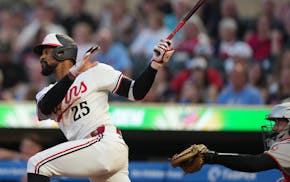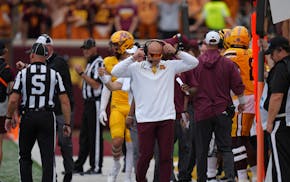Luka Doncic scored four consecutive points in Game 3 after isolating against Rudy Gobert — two from the free-throw line and another on a jump shot. The score was tied 103-103, and Timberwolves coach Chris Finch called a timeout. He took Gobert out and put Naz Reid back in the game.
The Wolves then outscored the Lakers 13-1 to win the game 116-104 on Friday night and take a 2-1 lead in the best-of-seven first-round NBA playoff series headed into Game 4 on Sunday at Target Center.
The adjustment was the most obvious example of something Finch has done throughout the season with his depth off the bench; instead of being married to the same closing lineup, he will close with whatever mix of five players makes most sense on a given night. Even if that means Gobert is quote-unquote played off the floor because of unfavorable matchups.
Against a smaller Lakers team, Finch pulled that lever, and the lineup the Wolves had on the floor for the final 4 minutes, 37 seconds spaced the floor offensively and played good defense without Gobert. The configuration was Reid-Julius Randle-Jaden McDaniels-Anthony Edwards-Donte DiVincenzo. It equaled a Wolves win.
"Down at the [offensive] end of the floor we had a pretty good rhythm before that so it was easy to return to that," Finch said of his decision.
Edwards especially found room to operate with that lineup, and the Wolves' clutch-time offense never looked better than it did in Game 3.
The regular season laid the groundwork for the move. The Wolves often brag about how they have "eight starters," and throughout the season, Finch has not been afraid to close with any of the eight. But that can be perilous to a team's culture, when egos, minutes and playing time are all involved.
"Everybody wants to finish games. Everybody wants to play all the minutes out there," Finch said. "For the most part, everybody's been great.
"It's a conversation we've had before the playoffs start every year, and our most experienced guy, Mike Conley, just stands up and says, 'Hey, man, whatever it takes. That's what we're going to do.' If it means playing you or not playing you, starting you or not starting you.' "
On Friday, that also meant Conley sat in favor of DiVincenzo. That tone Conley set can carry over to the rest of the locker room, even as the Wolves were getting used to this reality during the regular season.
"It's something that I think it took a season to just get used to it for a lot of guys, because we've had so many different lineups to finish games, just with how the game is going and how we're feeling it out," Conley said. "... That selfless nature that we have is going to win us games and give us a good chance to be a very good team."
Randle said the team's trust in Finch to manage these situations was "extremely high," and he credited Finch for instilling the desire to win in individual players, even if it means that night they may have to sit down the stretch. That's happened to Randle at various times as well.
"He wants to win, and everybody in the locker room wants to win as well," Randle said. "That's all it's about right now. It's not about egos, or minutes, shots. None of that stuff matters. What matters like tonight, at the end of the night, did we get the win? That's what we play for every single night. We're a very much together group and we recognize all those situations."
Coming into the series, one of the strengths was the Wolves' depth, and Finch wasn't afraid to tap into it, even if it meant sitting some long-established veteran starters to get the win.
"Even if you don't finish the game, we're gonna need you at some point," Randle said. "So it might not be your night tonight, but having that trust he is going to put you in when we need you, that's all we can ask for."

Buxton returns to top of Twins lineup and to his post in center field

U.S. Rep. Tom Emmer singles out teenage transgender athlete in social media post
Resetting Vikings' depth chart, position battles as spring practices begin

Vikings, GM Kwesi Adofo-Mensah agree to contract extension

![LeBron James of the Lakers reacts to a fan's comments on Friday night at Target Center.
] CARLOS GONZALEZ • carlos.gonzalez@startribune.com](https://arc.stimg.co/startribunemedia/RB6CC7XCKJB4DMFRWCXWPNVPVA.jpg?w=600&h=600&auto=format%2Ccompress&cs=tinysrgb)